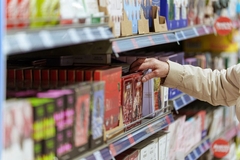
- Industry news
Industry news
- Category news
Category news
- Reports
- Key trends
- Multimedia
- Journal
- Events
- Suppliers
- Home
- Industry news
Industry news
- Category news
Category news
- Reports
- Key trends
- Multimedia
- Events
- Suppliers
E. coli Outbreak: EU Temporarily Bans Import of Egyptian Seeds

The E. coli (O104) outbreak is responsible for 48 deaths in Germany and one in Sweden. The total number of cases reported in the EU, Norway and Switzerland is 4,178.
7/6/2011 --- The European Union is withdrawing from the market, and temporarily banning the import of, certain types of seeds from Egypt after Egyptian fenugreek seeds were linked to the E. coli outbreaks (O104 strain) in northern Germany and Bordeaux, France. The decision follows a European Food Safety Authority (EFSA) report, which established a link between the outbreaks and seeds from Egypt.
Health and Consumer Commissioner John Dalli said: “Tracing back the origins of the E. Coli 0104 contaminations in Germany and France has been a key priority for the EU from day one of the crisis. The report published leads us to withdrawing of some Egyptian seeds from the EU market and to a temporary ban on imports of some seeds and beans originating from that country. The Commission will continue to monitor the situation very closely and will take additional measures if necessary".
In particular, the decision provides that Members States have to ensure that all lots of fenugreek seeds imported from one Egyptian exporter between 2009 and 2011 are withdrawn from the market, sampled and destroyed. Also, the decision provides that imports of Egyptian seeds and beans for sprouting are suspended until October 31.
The measures, which are applicable immediately, were supported earlier by the Member States in the Standing Committee on the Food Chain and Animal Health (SCoFCAH) following a Commission proposal on the issue. They will be reassessed regularly on the basis of guarantees offered by Egypt, results of laboratory testing and controls carried out by the Member States.
The EFSA report establishes that one lot of fenugreek seeds imported from one Egyptian exporter is the most likely common link between the two outbreaks. The report does not exclude that other lots may be implicated.
EFSA also notes that –given the severity of the outbreaks and the absence of information on the means of contamination– it is appropriate to consider all lots of fenugreek seeds from the identified Egyptian exporter, and for the period 2009-2011, as suspect. In addition, the report notes that the contamination probably occurred before the seeds left the importer. The production or distribution process apparently allowed contamination with faecal material of human and/or animal origin. Where exactly this contamination occurred is still unknown, the report notes.
The EU imports seeds for sprouting mainly from India and China. In 2010, the EU imported from Egypt about 49,000 tons of the types of seeds affected by today's decision. Their total value was over 56 million euros.
The German authorities first notified the Commission's services of an E. coli outbreak on May 22. All of the Commission's networks have been fully operational since then. For instance, the Rapid Alert System for Food and Feed and the Early Warning and Response System ensure rapid distribution of information throughout the EU.
On June 5, a group of EU experts went to Germany to provide assistance with the epidemiology and with verifying results and contributed to the investigations to identify the source of contamination. On June 10 and 11, the German authorities confirmed, through epidemiology and laboratory testing, that the specific E. coli strain (O104), which is responsible for the outbreak, was detected in sprouts from one farm close to the city of Hamburg.
On June 23, France notified that people in the Bordeaux area got infected by E. coli after consuming bean sprouts. Laboratory tests that followed confirmed that it was the O104 strain. Yesterday's EFSA report establishes a link between Egyptian seeds and the outbreaks in Germany and France.
The E. coli (O104) outbreak is responsible for 48 deaths in Germany and one in Sweden. The total number of cases reported in the EU, Norway and Switzerland is 4,178.
The European Commission has approved 26 programmes in 13 Member States to provide information on and to promote agricultural products in the European Union. The total budget for the programmes, which will run for between one and three years, is €75.1 million, of which the EU will contribute €37.6 million (50%). The selected programmes cover wine, PDOs, PGIs and TSGs, organic food and farming, fruit and vegetables, horticulture, milk and milk products, olive oil and table olives, eggs, seed oil and meat.
‘European Union agricultural products are unique in their quality and diversity,’ said Dacian Ciolos, Commissioner for Agriculture and Rural Development. ‘In an increasingly open global market, it is not enough to produce excellent food and drink. We must increase efforts to communicate the standards and quality of European agricultural products to consumers. EU programmes of this kind are an effective way of helping our producers in an increasingly competitive world.’
In addition to these programmes and in light of the E. coli crisis, Commissioner Dacian Ciolos has proposed a regulatory change which will enable professional organisations to submit additional promotional programmes for fresh fruit and vegetables in the single market and in third countries by 15 August. He intends to propose an additional budget of €15 million for this initiative. These promotion campaigns could be launched by the autumn (a Commission decision is expected on 15 November 2011 on the basis of projects submitted by the Member States by 15 September). The proposed schedule will halve the usual adoption procedure associated with cofinanced programmes of this sort. Details of the practical arrangements for this initiative will be available soon.











